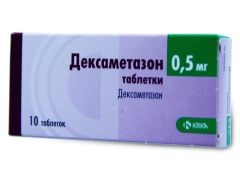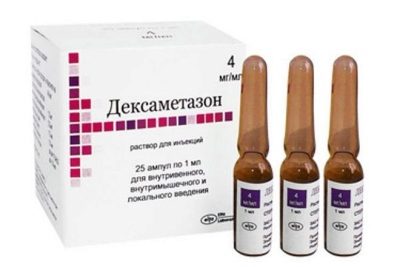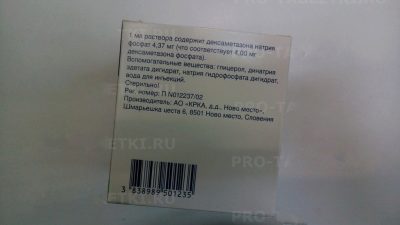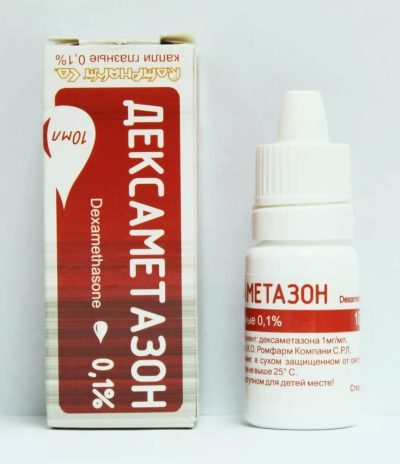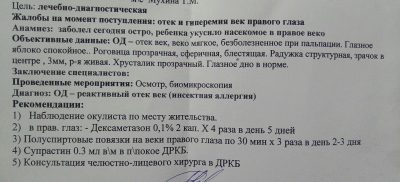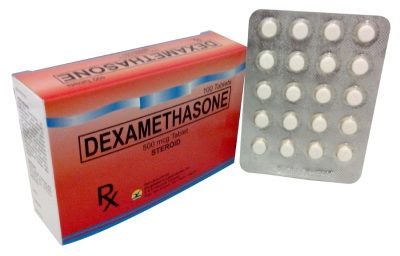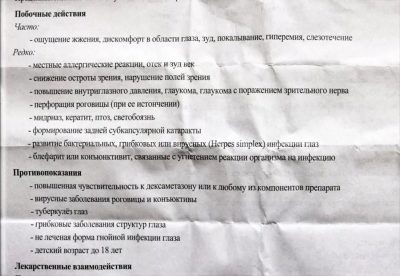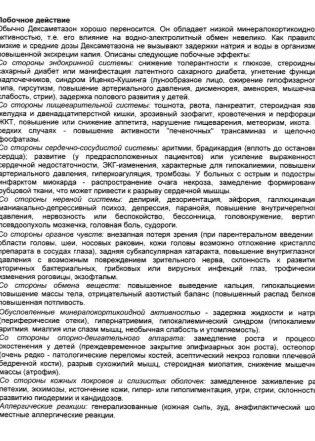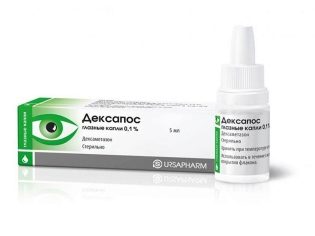Dexamethasone children
"Dexamethasone" refers to drugs that can save lives in some cases. Such a hormonal agent effectively copes with an anaphylactic reaction, bronchospasm, toxic shock and many other dangerous conditions. Not everyone knows when it is prescribed to children, in what form it is used, what adverse reactions it can cause in childhood and what the consequences of exceeding its dosage may be.
Release form
"Dexamethasone" is produced in these forms.
Pills
They are small, round flat in shape and often white. One pack contains them 10, 20 pieces or more.
Eye drops
They are represented by plastic bottles of 5, 10 ml colorless transparent solution.
Ampoules with a solution for pricking into a muscle or vein
One ampoule of such a medicine contains 1-2 ml clear solution, which is often colorless, but may be slightly yellowish. One box includes 5 or 10 ampoules
Composition
The main component of any form of the drug is dexamethasone in the form of sodium phosphate. This compound is contained in 1 ml of solution for injections at a dose of 4 mg, and in one tablet - in an amount of 500 μg (0.5 mg). The concentration of this substance in the eye drops is 0.1%, which corresponds to 1 mg per 1 ml of solution.
In the solution for injections, in addition to the active compound, there is sterile water, sodium hydrogen phosphate, edetate disodium, and glycerol. Eye drops include additional ingredients such as benzalkonium chloride, edetate disodium, water, decahydrate sodium tetraborate and boric acid. Auxiliary additives of the tablet form are lactose, corn starch, colloidal silicon dioxide, povidone, talc and magnesium stearate.
Operating principle
Have dexamethasone, is a glucocorticoid hormone, there is a very strong anti-inflammatory effect on the body. This substance blocks the release and reduces the activity of compounds called inflammatory mediators. Under its influence, cellular immune reactions are inhibited, due to a decrease in the permeability of cell membranes and capillary walls, Dexamethasone has an antiexudative effect. In addition, it is involved in metabolic processes and affects the pituitary gland.
A strong anti-inflammatory effect is manifested when used locally. The use of the drug for inhalation with a nebulizer directly affects the respiratory tract, which leads to a decrease in throat swelling and the elimination of bronchospasm.
Eye drops act only on the mucous membrane of the eyes, suppressing the local inflammatory reaction that occurs during immune, chemical or mechanical damage.
Sometimes these drops are prescribed for rhinitis and sinusitis, if such diseases have a protracted course or an allergic nature. In this case "Dexamethasone" use to eliminate nasal congestion (for emergency), as well as for adenoids, sinus or otitis.
In addition, in some cases, ENT doctors include such a drug in the composition of complex drops. In their recipes, the hormone is combined with antiseptics, antibacterial agents, vasoconstrictor drugs and other drugs - for example, they combine "Dexamethasone", «Xylen» and «Dioxidine».
Indications
Dexamethasone injections are given intramuscularly or intravenously in acute cases or in situations where ingestion is not possible. In other cases, use the tablet form.
The drug is effective:
- With anaphylactic shock or other severe allergies.
- With swelling of the brain, the cause of which is trauma, as well as surgery, meningitis, tumor process and other factors.
- In case of insufficiency of the adrenal cortex.
- When toxic, burn or traumatic shock.
- With severe bronchospasm or asthmatic status.
- With rheumatic or systemic diseases.
- For severe forms of dermatosis.
- With Crohn's disease or ulcerative colitis.
- With hemolytic anemia and other blood diseases.
- With glomerulonephritis.
- With severe infections.
- With leukemia and other neoplasms.
The injection form can also be used topically, for example, injected into the pathological formation of soft tissues, into the joint or into the eye tissue. For an emergency decrease in body temperature, a lytic mixture with "Dexamethasone"whose components are «Analgin» and «Diphenhydramine».
Eye drops are used for keratitis, conjunctivitis, iritis, uveitis and other diseases of the organ of vision. Inhalation with "Dexamethasone" prescribed by doctors for obstructive bronchitis, barking cough, false croup (laryngeal stenosis). The drug is poured into the nebulizer with saline and carry out the procedure for 5-10 minutes.
At what age is it allowed to take?
If there are serious indications for the use of Dexamethasone, this medication can be prescribed at any age, even a 10-month-old or one-year-old child. In this case, treatment with such a hormonal agent should be only under medical supervision (both for children under one year old and an older child). Giving the drug to children without a doctor's prescription is unacceptable.
Contraindications
Any form of Dexamethasone is not used in case of hypersensitivity to substances in its composition. The drug is contraindicated in acute viral, fungal or bacterial infections. Eye drops should not be used if the integrity of the cornea is damaged.
Injections and tablets are not prescribed for vaccination (when using live vaccines) and with Itsenko-Cushing syndrome. Injections are prohibited for serious problems with hemostasis, and tablets because of the lactose content are not prescribed for disorders of carbohydrate metabolism.
Patients with arterial hypertension, tuberculosis, renal failure, epilepsy, peptic ulcer, hypothyroidism, liver failure and some other pathologies require caution in prescribing the drug. If the child has some chronic disease, the question of the appointment of "Dexamethasone" should be decided by a specialist on an individual basis.
Side effects
Treatment with Dexamethasone can provoke:
- An allergic reaction - for example, urticaria or dermatitis.
- Headaches, neuropathies, dizziness and other negative symptoms of the nervous system.
- Nausea, peptic ulcer, pancreatitis and other problems with the gastrointestinal tract.
- Suppression of growth processes in the body of a child.
- Intensification of infectious or parasitic diseases.
- Adrenal insufficiency.
- Cataract or glaucoma.
- Disorders of the heart - for example, bradycardia, heart failure or extrasystole.
- Weight gain, hyperglycemia, water retention and other metabolic disorders.
- Increased blood pressure.
- Muscle weakness or atrophy.
- Mental disorders.
- Slow healing of wounds, thinning of the skin, the appearance of stretch marks and acne.
- Decreased lymphocyte, eosinophil, platelet or monocyte levels.
In addition, a local reaction may occur to the drug - for example, a burning sensation during the injection or redness of the skin after the injection. If, however, abolish the drug abruptly, it will lead to the development of withdrawal syndrome, manifested by a decrease in blood pressure, nausea, headache and other negative symptoms.
Instructions for use
The dosage of the drug in each case is selected individually, taking into account the type of disease, tolerance of hormonal treatment, the patient's response to therapy and other factors. For children, the dose must be calculated by body weight. Often do the calculation of the surface area of the body. Having determined the daily amount of Dexamethasone, it is divided into 3-4 doses, thus determining the single dose of the drug.
Overdose
If you exceed the doctor's prescribed dose of medication, this will lead to increased blood pressure, edema, hyperglycemia, impaired consciousness and other symptoms. Treatment in this situation is prescribed symptomatic.
Drug interaction
“Dexamethasone” should not be combined with many other drugs, including non-steroidal anti-inflammatory drugs, macrolides, ketoconazole, frothinolones, phenytoin, thiazide diuretics, antihypertensive drugs, heparin and other drugs. A full list of them is included in the instructions to the drug.
Terms of sale
To purchase any form of Dexamethasone, you must first obtain a prescription from a doctor. The price of a pack of 25 ampoules is on average 200 rubles, and a box of 10 tablets is about 40 rubles.
Storage conditions and shelf life
Keep Dexamethasone ampoules, drops or tablets at home at a temperature below +25 degrees. The place where the medicine is stored must not be accessible to the child. The shelf life of the injectable form and tablets is 5 years, eye drops - 3 years (after opening - no longer than 28 days)
Reviews
On the use of "Dexamethasone" in childhood there are many positive reviews, in which the drug is called effective and effective in inflammatory processes and allergic diseases. The disadvantages of the drug include the frequent occurrence of side effects and the high risk of overdose in childhood.
Analogs
Replacement "Dexamethasone" can be drugs that have the same active substance. These include Dexamed, "Megadeksan", Dexazone, Maxidex, "Deksapos" and other medicines. They are available in different forms, which allows you to choose the necessary counterpart. In addition, instead of Dexamethasone, the doctor may prescribe other drugs from the group of glucocorticoids - for example, drugs based on hydrocortisone, budesonide, or mometasone.
About the indications, the use of Dexamethasol and much more about this drug can be seen in the video.
